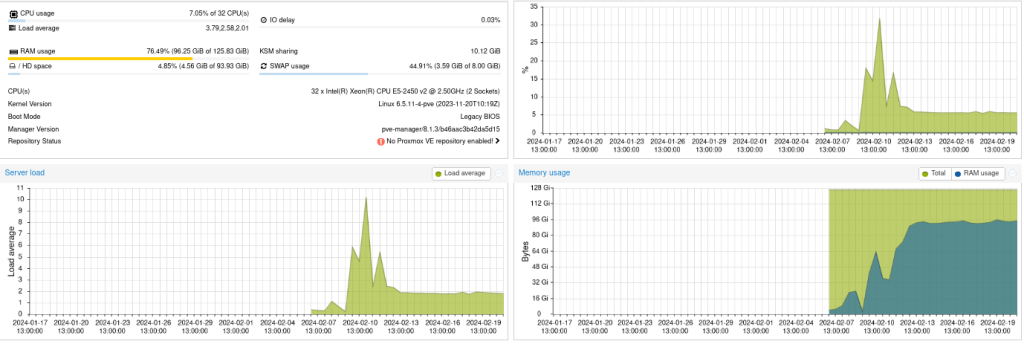Etape 1 : Localisation du disque avec la command fdisk :
# fdisk -l
Disk /dev/sda: 238,5 GiB, 256060514304 bytes, 500118192 sectors
Disk model: SMI
Units: sectors of 1 * 512 = 512 bytes
Sector size (logical/physical): 512 bytes / 512 bytes
I/O size (minimum/optimal): 512 bytes / 512 bytes
Disklabel type: gpt
Disk identifier: B9D6E0E3-54C2-41BC-BBF8-3464FCE6A229
Device Start End Sectors Size Type
/dev/sda1 2048 999423 997376 487M EFI System
/dev/sda2 999424 98656255 97656832 46,6G Linux filesystem
/dev/sda3 98656256 469749759 371093504 177G Linux filesystem
/dev/sda4 469749760 500117503 30367744 14,5G Linux swap
Disk /dev/sdb: 111,8 GiB, 120034123776 bytes, 234441648 sectors
Disk model: KINGSTON SA400S3
Units: sectors of 1 * 512 = 512 bytes
Sector size (logical/physical): 512 bytes / 512 bytes
I/O size (minimum/optimal): 512 bytes / 512 bytes
Disklabel type: dos
Disk identifier: 0x7ac27f0a
Device Boot Start End Sectors Size Id Type
/dev/sdb1 2048 234441647 234439600 111,8G 83 Linux
Disk /dev/sdc: 931,5 GiB, 1000204886016 bytes, 1953525168 sectors
Disk model: Portable SSD T5
Units: sectors of 1 * 512 = 512 bytes
Sector size (logical/physical): 512 bytes / 512 bytes
I/O size (minimum/optimal): 512 bytes / 33553920 bytes
Disklabel type: dos
Disk identifier: 0x7beb508f
Device Boot Start End Sectors Size Id Type
/dev/sdc1 2048 1953522112 1953520065 931,5G 7 HPFS/NTFS/exFAT
# fdisk -l /dev/sdc1
Disk /dev/sdc1: 931,5 GiB, 1000202273280 bytes, 1953520065 sectors
Units: sectors of 1 * 512 = 512 bytes
Sector size (logical/physical): 512 bytes / 512 bytes
I/O size (minimum/optimal): 512 bytes / 33553920 bytes
Disklabel type: dos
Disk identifier: 0x00000000
Device Boot Start End Sectors Size Id Type
/dev/sdc1p1 4294967295 8589934589 4294967295 2T ff BBT
/dev/sdc1p2 4294967295 8589934589 4294967295 2T ff BBT
/dev/sdc1p3 4294967295 8589934589 4294967295 2T ff BBT
/dev/sdc1p4 4294967295 6854241533 2559274239 1,2T ff BBT
La premiere commande localise mon nouveau disque, avec la seconde j’ai plus de détail.
Etape 2 : Formatage, pas question de laisser en mode Windows
# sudo mkfs.ext3 /dev/sdc1
mke2fs 1.44.5 (15-Dec-2018)
/dev/sdc1 contains a exfat file system labelled 'Samsung_T5'
Proceed anyway? (y,N) y
Creating filesystem with 244190008 4k blocks and 61054976 inodes
Filesystem UUID: 6db583fc-825f-4a0c-9ea5-dbb79bd6ae9f
Superblock backups stored on blocks:
32768, 98304, 163840, 229376, 294912, 819200, 884736, 1605632, 2654208,
4096000, 7962624, 11239424, 20480000, 23887872, 71663616, 78675968,
102400000, 214990848
Allocating group tables: done
Writing inode tables: done
Creating journal (262144 blocks): done
Writing superblocks and filesystem accounting information: done
Ou mieux en ext4 :
# sudo mkfs.ext4 /dev/sdc1
mke2fs 1.44.5 (15-Dec-2018)
/dev/sdc1 contains a ext3 file system
created on Fri Nov 13 11:49:54 2020
Proceed anyway? (y,N) y
Creating filesystem with 244190008 4k blocks and 61054976 inodes
Filesystem UUID: bf1d9240-ba6d-4230-8e4e-dd20218231e8
Superblock backups stored on blocks:
32768, 98304, 163840, 229376, 294912, 819200, 884736, 1605632, 2654208,
4096000, 7962624, 11239424, 20480000, 23887872, 71663616, 78675968,
102400000, 214990848
Allocating group tables: done
Writing inode tables: done
Creating journal (262144 blocks): done
Writing superblocks and filesystem accounting information: done
Etape 3 : Le montage automatique :
# mkdir /media/usbdisk-1
Voir le uuid :
# ls -l /dev/disk/by-uuid/*
lrwxrwxrwx 1 root root 10 nov. 10 10:20 /dev/disk/by-uuid/1D2E-E63C -> ../../sda1
lrwxrwxrwx 1 root root 10 nov. 10 10:20 /dev/disk/by-uuid/5fa91220-4d17-485d-bb7d-3e41fc04e15b -> ../../sda2
lrwxrwxrwx 1 root root 10 nov. 10 10:20 /dev/disk/by-uuid/64b51c15-9706-4ac5-a369-774ce9539762 -> ../../sda3
lrwxrwxrwx 1 root root 10 nov. 13 15:05 /dev/disk/by-uuid/bf1d9240-ba6d-4230-8e4e-dd20218231e8 -> ../../sdc1
lrwxrwxrwx 1 root root 10 nov. 10 10:20 /dev/disk/by-uuid/c8478b72-fcaf-4dc7-87a7-5156cc19efab -> ../../sdb1
lrwxrwxrwx 1 root root 10 nov. 10 10:20 /dev/disk/by-uuid/d4f59815-be3d-437c-b204-ca794d170ce9 -> ../../sda4
Ajouter dans /etc/fstab :
UUID=bf1d9240-ba6d-4230-8e4e-dd20218231e8 /media/usbdisk-1 ext4 errors=remount-ro 0 1
Monter le disque ensuite :
# mount /media/usbdisk-1
# df -h
Sys. de fichiers Taille Utilisé Dispo Uti% Monté sur
udev 3,9G 0 3,9G 0% /dev
tmpfs 783M 66M 718M 9% /run
/dev/sda2 46G 7,3G 37G 17% /
tmpfs 3,9G 8,0K 3,9G 1% /dev/shm
tmpfs 5,0M 0 5,0M 0% /run/lock
tmpfs 3,9G 0 3,9G 0% /sys/fs/cgroup
/dev/sdb1 110G 43G 62G 42% /mnt/backup
/dev/sda1 487M 5,2M 481M 2% /boot/efi
/dev/sda3 174G 30G 135G 19% /home
tmpfs 783M 4,0K 783M 1% /run/user/112
tmpfs 783M 0 783M 0% /run/user/1000
/dev/sdc1 916G 77M 870G 1% /media/usbdisk-1
C’est fini !
J’aime ça :
J’aime chargement…

